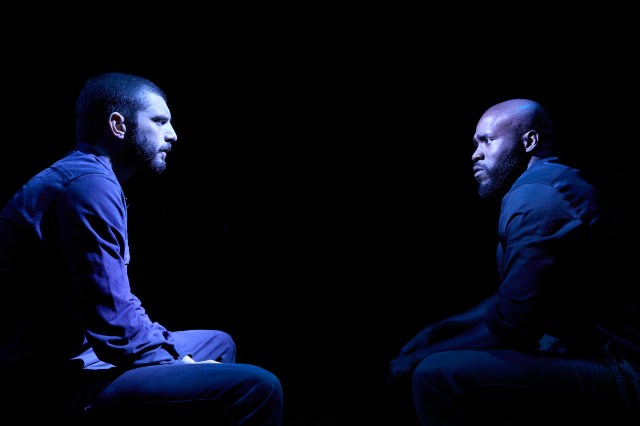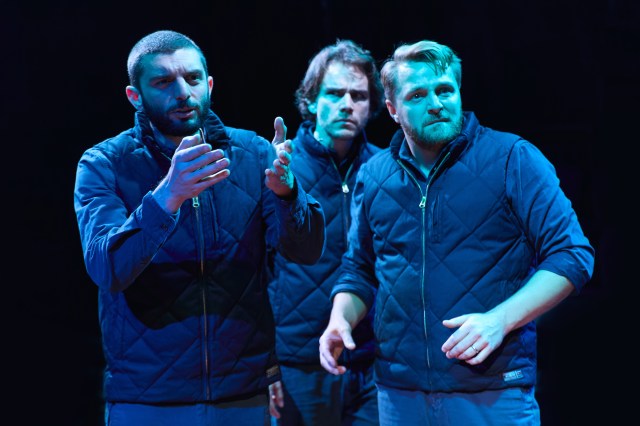Othello at Riverside Studios – review
Sinéad Rushe’s production, featuring three actors simultaneously playing the role of Iago, runs until 29 October

After Hamlet and Richard III, the role with the most lines in the Shakespearean canon is Iago, the deceitful right-hand man of the titular Othello. Director Sinéad Rushe has spared her actors memories for this lean, dynamic new version of arguably the most problematic of the “big four” tragedies, by cutting the play down to a fleet 100 minutes of playing time, and dividing the role of the jealous villain between three actors.
It’s a bold, unusual move, but whether it really adds anything to our perception of the play and the character who drives it, is questionable. Although the role is split, Michael C Fox carries the majority of the verse speaking, with Orlando James and Jeremy Neumark Jones employed more as glowering, watchful attendants who make occasional interjections. All three actors deliver their tranches of Iago with passion and commitment, but there isn’t much sense of them being the same person, despite their matching costumes, and it feels more like a gimmick, albeit a striking one, rather than anything genuinely illuminating.

More successfully, Rushe repeatedly blurs the lines between stage movement and dance, which results in some memorable sequences, all the more remarkable for being played out on an almost entirely bare stage. The depiction of a storm at sea with little more than the actors’ bodies, some drapery and Alex Lewer’s inventive lighting, is thrilling, and the final images of Desdemona caught up in the same material desperately trying to escape her husband before finally lying slain and wrapped in it, is unforgettable.
Fox is also responsible for the folky, Latin-tinged musical elements in a production that is more impressive in terms of the atmospherics than in representing the Shakespeare play. Martins Imhangbe makes a humane, relatable Othello but his torment doesn’t feel deep or painful enough, and his verse speaking tends towards the monotonous. Rachel-Leah Hosker is very good doubling up as Roderigo and Emilia, but doesn’t have sufficient stage time as either to really make them register, which is especially frustrating in the case of the latter, Emilia being a role that can prove devastatingly potent when properly directed and not edited into oblivion. Ryan O’Doherty does subtly contrasting but solid work as Cassio and Brabantio.
Rose Riley’s Desdemona proves the most commanding performance, which is perhaps unexpected given her story arc. Riley presents a grounded, intelligent young woman in love, acutely aware of the social and familial ramifications of her affection for Othello but resilient enough to stand her ground. Her strength makes her final demise all the more moving.
As an introduction to Shakespeare’s Othello, this works tremendously well: it’s engaging, playful even. Purists and theatregoers who want a bit more to sink their teeth into may find this truncated version somewhat frustrating however, and it’s one of those rare shows that really would benefit from being longer. Still, it’s undeniably a production that delights in the rough magic and imaginative possibilities of theatre.
















